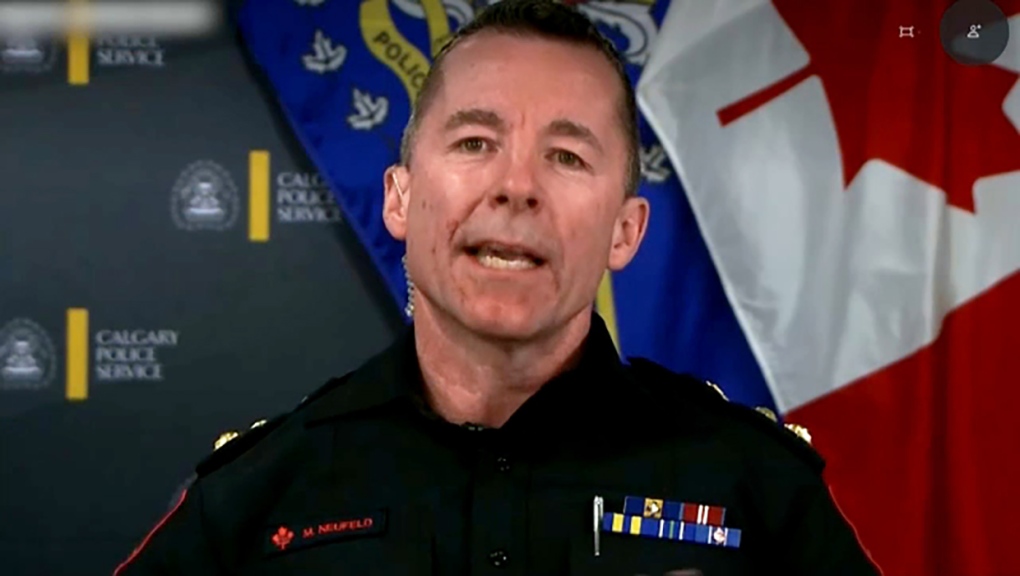'Not ready': Alberta police association says it won't support drug decriminalization
As others in Canada start to take steps towards new personal possession rules, Alberta's police association says it's too soon to decriminalize hard drugs in our province.
Calgary's top cop Mark Neufeld, speaking on behalf of the Alberta Association of Chiefs of Police, says there's not enough evidence that shows the strategy alone will have an impact.
"By itself, decriminalization would not reduced rates of addiction or overdose," he said. "(It) triggers an immediate need for structural and societal changes in areas that do not currently exist."
The association says there is still work in health, social services and justice that needs to be done before rules can be overhauled. It believes premature changes will result in complaints and open public drug use that will lead to more work for officers.
"If you were to just pull sort of one lever, and it was going to be the decriminalization lever, all it would do is just make it easier to possess illicit drugs and also to see individuals using them in public," Neufeld said. "We're not ready."
 Calgary police chief Mark Neufeld says the city isn't ready to decriminalize drugs
Calgary police chief Mark Neufeld says the city isn't ready to decriminalize drugs
OPEN DRUG USE HAPPENING NOW: ADVOCATES
But while the chief is trying to save his officers added duties, many advocates point out that policing work is already embedded in drug use effects -- and decriminalization would be a step to remedying that.
Across the country in 2018 to 2020, almost 28,000 annual arrests were made for possession.
"We're making people's lives very miserable if they use drugs," advocate Euan Thomson told CTV News. "With a new strategy, drug use will likely go down, people will gain stability in their lives and as their human rights are restored, and our communities will actually become safer."
Thomson points to Portugal, where decades-old decriminalization can be directly linked to a decrease in overdose deaths and drug use in teens, and to an increase in those seeking treatment.
"Decriminalization is very much needed, even if it's on its own," Thomson said. "Just like we saw with cannabis legalization, the sky is not going to fall on the day you decriminalize all drugs."
The City of Vancouver has applied for an exemption from the federal controlled substances act so it can update its personal possession rules.
British Columbia applied to the federal government in November to remove criminal penalties for people who possess small amounts of illicit drugs for personal use. The province argued that substance abuse and addiction is a public health issue, not a criminal one.
Since B.C. declared a public health emergency in 2016, 7,700 British Columbians have died because of a toxic drug supply.
Toronto's board of health said it would also seek permission from the federal government to allow drug users to carry small amounts for personal use.
Calgary's police chief expects many more cities will also explore that option.
"We're aware that other provinces have submitted requests to Health Canada seeking an exemption from the Controlled Drugs and Substances Act that would decriminalize personal possession of illicit drugs. These are conversations that are ongoing in our province as well,'' said Neufeld.
"I'm not concerned that this is moving forward in any way that's imminent. It is a discussion that has been ongoing for the last number of years, which has been intensified obviously by the drug poisonings and opioid overdoses."
As of now, no changes are imminent in Alberta.
With files from The Canadian Press .
CTVNews.ca Top Stories

Breast cancer screening should start at age 40, Canadian Cancer Society says
The Canadian Cancer Society says all provinces and territories should lower the starting age for breast cancer screening to 40.
DEVELOPING Live updates as Stormy Daniels testifies at Trump hush money trial
Adult film star Stormy Daniels is on the stand a second time Thursday as former U.S. president Donald Trump’s hush money case continues in Manhattan. Follow live updates here.
Ontario family receives massive hospital bill as part of LTC law, refuses to pay
A southwestern Ontario woman has received an $8,400 bill from a hospital in Windsor, Ont., after she refused to put her mother in a nursing home she hated -- and she says she has no intention of paying it.
Canadian-Israeli man shot dead in Egypt; claim links killing to Gaza
A Canadian man 'of Jewish Israeli descent' has been shot dead in the Egyptian city of Alexandria in a suspected criminal case, a security source said, while a previously unknown militant group said it carried out the attack in reaction to the war in Gaza.
Here are the ultraprocessed foods you most need to avoid, according to a 30-year study
Studies have shown that ultraprocessed foods can have a detrimental impact on health. But 30 years of research show they don’t all have the same impact.
Ontario man frustrated after $3,500 paving job leaves driveway in shambles
An Ontario man considering having his driveway paved received a quote from a company for $7,000, but then, another paver in the neighbourhood knocked on his door and offered half that rate.
Why these immigrants to Canada say they're thinking about leaving, or have already moved on
For some immigrants, their dreams of permanently settling in Canada have taken an unexpected twist.
Bank of Canada says financial system is stable, but risks remain
The Bank of Canada says the Canadian financial system is stable, but risks remain due to debt servicing costs among households and businesses and stretched valuations of financial assets.
BREAKING Sheldon Keefe out as head coach of Toronto Maple Leafs
The Toronto Maple Leafs have fired head coach Sheldon Keefe. The team made the announcement Thursday after the Original Six franchise lost to the Boston Bruins in seven games in the first round of the Stanley Cup playoffs.

































